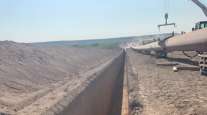Senior Reporter
US House Transportation Committee Advances Pipeline Safety Bill

[Stay on top of transportation news: Get TTNews in your inbox.]
Legislation that aims to enhance safety across pipeline systems, as well as tackle concerns related to climate change, recently was advanced by a panel in the U.S. House of Representatives.
The legislation would seek to reduce greenhouse gas emissions, such as methane, as well as address matters related to leaks. It also would evaluate regulations pertaining to earthquake-prone areas.

DeFazio
“Although this bill has traditionally focused on safety alone, for the first time it will meaningfully address climate change by requiring pipeline operators to reduce methane emissions,” Transportation and Infrastructure Committee Chairman Peter DeFazio (D-Ore.) said Nov. 20. “It also includes important safety improvements to address unregulated gathering lines, ensure safety for maintenance workers and does more to hold operators accountable for reckless actions, among other things.”
The House Energy and Commerce Committee advanced the measure the previous day. That committee’s chairman, Rep. Frank Pallone (D-N.J.), emphasized the safety benefits from enhancing the efficiency of pipelines, as well as bolstering environmental protections.

Pallone
“The legislation will also help protect our climate by reversing the [President Donald] Trump rollback of President [Barack] Obama’s methane rules. This is a strong bill that is necessary to make our pipelines safe and secure, and I hope the full House will vote on it soon,” Pallone said.
The measure advanced to the chamber’s floor for consideration, and a vote has yet to be scheduled.
Specifically, the bill would require gas pipeline facilities operators to rely on the best-available technology meant to capture gas released during routine operations or maintenance. It also would require automatic shutoff or remote-controlled valves on new, existing and replaced pipelines. Advanced leak-detection technology also would be required.
It would require operators to immediately fix significant gas leaks on their pipelines. And, maximum civil penalties would be increased from $200,000 to $20 million per violation as a way to allow the Pipeline and Hazardous Materials Safety Administration (PHMSA) to hold operators accountable.
PHMSA also would be directed to finalize a rule on gas gathering lines. And, the National Academy of Sciences would be tasked with evaluating regulations related to earthquake-prone areas.
At the transportation committee, Republicans largely opposed the measure after the panel moved not to adopt a GOP-led amendment that would have sought to reauthorize PHMSA’s programs with what sponsors noted was significant support from stakeholders.

Graves
Transportation and Infrastructure Committee ranking member Rep. Sam Graves (R-Mo.) said in a statement soon after the bill’s consideration, “Past pipeline safety reauthorization laws, including in 2011 and 2016, were the result of successful collaboration between committee Republicans and Democrats. Regrettably, today’s approved bill doesn’t reflect that bipartisan tradition.”
Graves went on, “Instead it places the far left’s agenda over the safety and efficiency of the world’s largest network of pipelines. It is my hope the majority does not follow this same partisan process for the important work the committee must still do on reauthorizing surface transportation programs and passing a critical water resources bill.”
To Graves’ point, Railroads, Pipelines, and Hazardous Materials Subcommittee ranking member Rep. Rick Crawford (R-Ark.) stated in a newspaper editorial published Nov. 20 that Republicans on the committee “remain open to resuming discussions with our Democrat colleagues, and I hope that the leadership on the other side is willing to roll up their sleeves and get back to work with us.”
Crawford added, “Improving pipeline safety is a win for both sides of the aisle and for America.”
According to PHMSA, a 2.6 million-mile pipeline transportation system and nearly 1 million daily shipments of hazardous materials across various modes of transport falls under its jurisdiction.
Want more news? Listen to today's daily briefing:




